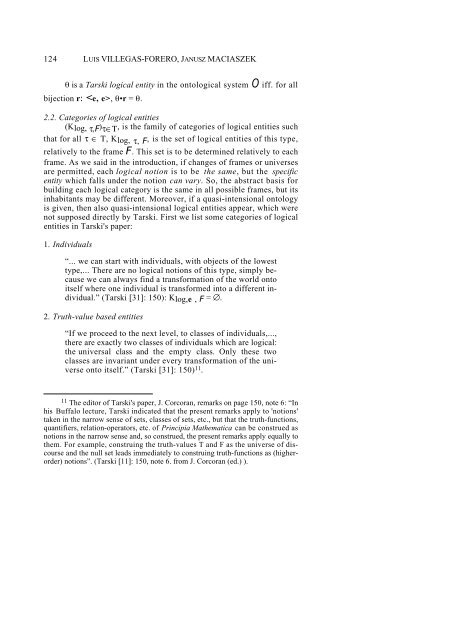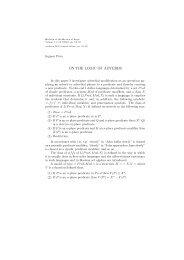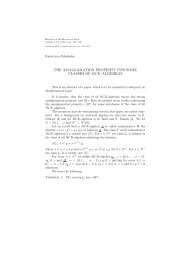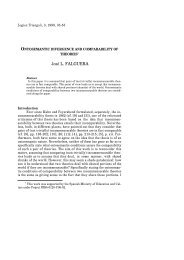Luis VILLEGAS-FORERO, Janusz MACIASZEK
Luis VILLEGAS-FORERO, Janusz MACIASZEK
Luis VILLEGAS-FORERO, Janusz MACIASZEK
Create successful ePaper yourself
Turn your PDF publications into a flip-book with our unique Google optimized e-Paper software.
124 LUIS <strong>VILLEGAS</strong>-<strong>FORERO</strong>, JANUSZ <strong>MACIASZEK</strong><br />
is a Tarski logical entity in the ontological system O iff. for all<br />
bijection r: , •r = .<br />
2.2. Categories of logical entities<br />
(Klog, τ,F ) τ∈Τ , is the family of categories of logical entities such<br />
that for all τ ∈ Τ, Klog, τ, F , is the set of logical entities of this type,<br />
relatively to the frame F. This set is to be determined relatively to each<br />
frame. As we said in the introduction, if changes of frames or universes<br />
are permitted, each logical notion is to be the same, but the specific<br />
entity which falls under the notion can vary. So, the abstract basis for<br />
building each logical category is the same in all possible frames, but its<br />
inhabitants may be different. Moreover, if a quasi-intensional ontology<br />
is given, then also quasi-intensional logical entities appear, which were<br />
not supposed directly by Tarski. First we list some categories of logical<br />
entities in Tarski's paper:<br />
1. Individuals<br />
“... we can start with individuals, with objects of the lowest<br />
type,... There are no logical notions of this type, simply because<br />
we can always find a transformation of the world onto<br />
itself where one individual is transformed into a different individual.”<br />
(Tarski [31]: 150): Klog,e , F = ∅.<br />
2. Truth-value based entities<br />
“If we proceed to the next level, to classes of individuals,...,<br />
there are exactly two classes of individuals which are logical:<br />
the universal class and the empty class. Only these two<br />
classes are invariant under every transformation of the universe<br />
onto itself.” (Tarski [31]: 150) 11 .<br />
11 The editor of Tarski's paper, J. Corcoran, remarks on page 150, note 6: “In<br />
his Buffalo lecture, Tarski indicated that the present remarks apply to 'notions'<br />
taken in the narrow sense of sets, classes of sets, etc., but that the truth-functions,<br />
quantifiers, relation-operators, etc. of Principia Mathematica can be construed as<br />
notions in the narrow sense and, so construed, the present remarks apply equally to<br />
them. For example, construing the truth-values T and F as the universe of discourse<br />
and the null set leads immediately to construing truth-functions as (higherorder)<br />
notions”. (Tarski [11]: 150, note 6. from J. Corcoran (ed.) ).


